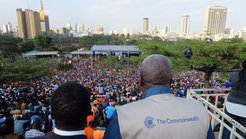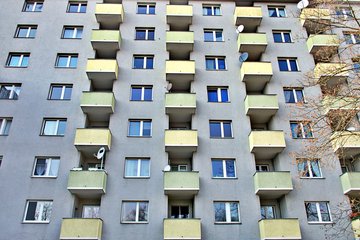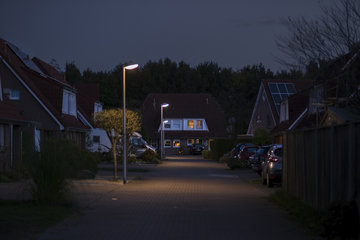Democracy in decline in Africa
Opinion: Elections in African states are manipulated, the opposition suppressed, demonstrations violently dissolved. Europe and the USA ignore this far too often, says political scientist Elena Gadjanova.

Electoral landslides, particularly in newly-democratizing states, are often a sign of trouble. Scholars of comparative democratization have long noted that the margin of victory in national elections is inversely related to a country’s quality of democracy. In October 2017, Uhuru Kenyatta, Kenya’s incumbent president, won 98% of the vote in a repeat election after the one in August was invalidated by the country’s Supreme Court. Uhuru’s ‘victory’ puts him in the rather dubious club of Paul Kagame of Rwanda, re-elected with 98.8% of the vote, Omar al-Bashir of Sudan (95%), Salva Kiir of South Sudan (93%), and Teodoro Mbasogo of Equatorial Guinea (94%).
Kenya’s opposition boycotted the poll, turn-out was a meagre 35% (in comparison, close to 80% of eligible voters cast a ballot in August the same year), and clashes between the police and opposition supporters resulted in a number of deaths in opposition strongholds.
Things looked very different just a month before - in September 2017 - when there was widespread optimism that Kenya would firmly set on to a pro-democracy path. The country’s Supreme Court annulled the August 2017 presidential election because of ‘massive irregularities and illegalities’, and ordered a new vote. The move was historic and was widely heralded as a triumph of the rule of law and due process over political impunity. Kenyan citizens were told by their own court that they could and should expect more from their institutions and politicians.
The tyranny of low expectations
This was important because elections in Africa often suffer from ‘the tyranny of low expectations’: lower standards are tolerated because of fears of political instability. Foreign election observers frequently overlook irregularities and rubber-stamp contests in Africa that would not be tolerated elsewhere because of the perennial expectation of violence and political unrest. This allows incumbents to subtly manipulate the vote and is deeply subversive to efforts to hold elected officials fully accountable.
Kenya’s Supreme Court decision invigorated pro-reform forces in the country and across Africa. At least for a moment, there was hope that justice would triumph over the desire to maintain the stability of the political system at all costs.
But measures designed to ensure free and fair repeat elections were never put in place. Citing “lack of time”, the electoral commission was not reformed and the same election officials who had botched the August poll were allowed to oversee the repeat election. Provisions were not made to better safeguard the security of the election transmission system, which had been severely compromised in August. The ruling Jubilee Party rammed a new election law through parliament, which limits the ability of the Supreme Court to annul elections in the future and stipulates that if a candidate withdraws from the election, the other candidate automatically wins. Supreme court judges were intimidated to the point where a last-minute petition to halt the October poll was not heard for lack of quorum because only two of the seven justices showed up.
And so, the few remaining institutional safeguards of democracy in Kenya are being eroded one by one. The Electoral Commission and Parliament were put in the service of the regime, and it appears that the courts are being neutralized. There is evidence the police engaged in ethnic profiling and violence targeting communities believed to support the opposition. Dozens of people were shot. Civil society organizations are stifled on a daily basis. The media, in the past regarded as one of the freest and most objective in Africa, have been turned into a mouthpiece for the ruling party.
Optimism turned into fear
The optimism of September 2017 quickly turned to resignation, cynicism, apathy, and fear. Thus, democracy in Kenya retreated back several decades over the course of a few months only: the speed of this transformation was remarkable. Autocrats elsewhere on the continent felt emboldened in turn.
Kenya’s election drama and autocratic retrenchment over the last year provides a template for the decline of democracy in the rest of Africa. Democracy’s prospects suffer when moments of hope and opportunity are squandered because a regime refuses to loosen its grip on power. We saw this bleak scenario currently play out in Togo, where protesters against Faure Gnassingbe, whose family has been in power for the past 50 years, were beaten and shot at, in Burundi, where President Nkurunziza’s move to extend his tenure to 2034 led to violent clashes, and in Uganda, where a vote to remove the presidential age limit descended into a physical fight on the floor of the parliament.
In Zimbabwe, Robert Mugabe’s firing of his vice-president in November 2017 in order to install his wife as successor precipitated an army coup. In the elections on 30 July 2018, the candidate of Mubage's ZANU-PF party once again emerged victorious, but the opposition doubts the results. In the protests that followed, the army shot demonstrators in the capital Harare and several people died.
Election observation missions failed collectively
In Zambia, which appeared to make strides towards democracy in the late 1990s, key democratic institutions such as the judiciary, civil society organizations, the police, and the Electoral Commission have gradually been co-opted, threatened, or silenced. Those in power show obvious disrespect for the rule of law and intolerance of any opposition voices. In result, the population has lost trust both in elected politicians, and in the democratic process as a whole. This growing apathy among voters is deeply corrosive to democracy in the long run.
In Tanzania, President John Magufuli’s administration banned political activities and demonstrations and moved to jail key leaders of the opposition. Abduction, torture, and political assassinations have been noted by civil society organizations and churches since 2016. In a sign of desperation, opposition members marched to the offices of the European Union delegation in Dar es Salaam in February 2018 to seek protection and support.
What has also become painfully evident over the past year in Africa, is that the international community needs to rethink its role in and approach towards “democracy promotion” on the continent. There was a collective failure of multiple election observer missions – by the EU, African Union, and US-based NGOs alike – to detect and sound the alarm on irregularities in the August 2017 Kenyan election. The preoccupation with stability and the tendency to overlook irregularities common to election observation missions in Africa in the past decade is part of the explanation. But another factor is that monitoring tools are no longer suited to the electronic process of tallying the vote count characterizing present-day African elections. Countries have adopted electronic registers and vote counting techniques, which allow for tampering that is on an entirely different scale and much harder to detect. It also takes place after the ballots are cast and often after election observers have already left the country.
Analogue monitoring for digital vote-counts
To paraphrase Kenyan analyst, writer, and blogger Nanjala Nyabola, the international community still uses analogue monitoring tools for Africa’s increasingly digital vote counts. For effective democracy promotion in Africa and beyond, the international community needs a change in expectations, tools, and methods. Withdrawing from observing elections, as the majority of missions did with Kenya’s repeat poll in October 2017, is not the answer either. It emboldens autocrats and further curtails pro-reform forces internally.
Another deeply subversive foreign influence on African democracy has been the increased involvement of international campaign “consultants” in the elections in various countries. The now notorious Cambridge Analytica is the most well-known, but far from the only example of this phenomenon. Boosted by novel micro-targeting techniques, the international campaign consulting business when combined with local autocrats and lax to non-existent privacy protection is highly dangerous. Hired by incumbents in Kenya and Nigeria, Cambridge Analytica planned and executed a campaign of ethnic fear-mongering and intimidation targeting the opposition. It spread rumors and false information through social networks and targeted text messages. In a country with a history of ethnic violence around elections, this is particularly sinister.
The harvesting of personal data from social networks without users’ knowledge and consent and its use for micro-targeting in election campaigns has become a global problem with far-reaching implications for governance and democracy world-wide. Cambridge Analytica was also involved in the 2015 Nigerian election, the June 2016 Brexit referendum, and Donald Trump’s 2016 election campaign. The firm’s work has exposed an underlying gap between the spread and growing importance of social networks in political communication, and the lack of proper regulation of this increasingly popular information medium. The implications of this gap are only now beginning to play out. To what extent it was able to sway election results is questionable, but it certainly contributed to a climate of fear and misinformation, which undermines people’s faith in the democratic process.
No excuse from Facebook

And in a striking parallel to the double standard election observers have long applied to elections in Africa, Facebook issued a formal apology to its users in the US and the UK for allowing personal data to be used by election consultants, but no such apology was forthcoming in Kenya, Nigeria, or anywhere else. Facebook was effectively signaling that in the global marketplace for personal data, some users should receive better treatment and deserve more protection than others. This is a boon to autocrats seeking to bend the rules to remain in power as they can add an additional powerful tool to their already extensive manipulation toolkits.
In sum, incumbents intent on clinging on to power by any means is the biggest threat to democracy in Africa and beyond. Autocrats maintain the façade of elections in order to legitimate their rule, but gradually and relentlessly undermine the institutions supporting democracy – the courts, electoral commissions, media, civil society - from within. Foreign election consultants are allowed to operate with impunity and have further tilted the playing field in favour of incumbents. Citizens have grown increasingly cynical, resigned, and apathetic and there is evidence support for democracy is dwindling across the continent. Voter apathy and fear in turn mean that increased authoritarianism is not met with outrage and counter-mobilization, allowing it to continue with impunity.
Still, it is really important to note that democracy is not in decline everywhere in Africa. After a prolonged political crisis threatening to rip Ethiopia apart along ethnic lines, the country’s new Prime Minister expressed support for multi-party democracy, committed to holding elections, decriminalized opposition parties, and ruled out prolonging his tenure. It is clear that suspending human rights and civil liberties at a time of crisis is a political choice, not a security imperative.
Ghana sets a positive example
Ghana held its sixth consecutive peaceful election resulting in the third turn-over of power in the country in December 2016 when the opposition party won the presidency and a majority in parliament. Elections have been very closely fought between two relatively consolidated and evenly matched political parties. In 2008, the margin of victory in the presidential race was less than 0.5%, in 2012 - 2%, and in 2016 – 9%. Yet results were accepted by the losing sides and all incumbents stepped down after being defeated at the ballot box. This was in large part because the Electoral Commission enjoys significant confidence and is seen as effectively managing the electoral process in the country. Botswana’s incumbent also recently stepped down after his term limit of 10 years in office was reached. Elections in the country are scheduled for 2019.
In general, incumbents relinquishing power when their terms in office are over or after being defeated at the ballot box is the one key difference between Africa’s democratic success stories and its failures. It builds confidence in the election process and in institutions, diffuses social tensions, and encourages all sides to invest in connecting to voters within existing democratic structures, not outside of them. Today’s election losers believe they can be tomorrow’s winners so they have an incentive to continue playing the game. Voters in turn are reassured that they can demand accountability and affect change through the ballot box so become protective of the system. Ghana’s democracy has become a great source of pride locally: in a survey I fielded in December 2016 asking people what makes them proud to be Ghanaian, many quoted the country’s track record of free, fair, and peaceful elections. When a regime type is seen as a value in itself and becomes integral to a positive national self-image, attacks and efforts at subversion are not likely to be tolerated and are less likely to be attempted. Resilient democracy thus requires a commitment both to its intrinsic value, and to its processes and institutions.
Elena Gadjanova, Senior Research Associate, Max Planck Institute for the Study of Religious and Ethnic Diversity Lecturer in Politics, University of Exeter













